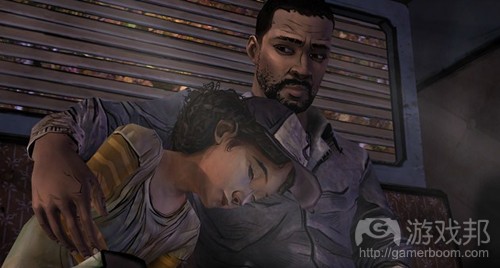分析《行尸走肉》意义超越“僵尸游戏”的原因
作者:Leigh Alexander
可以说,Telltale的《行尸走肉》堪称2012年的黑马。它采用的是市场需求趋于饱的僵尸题材 ,并且是一款授权游戏,其工作室是因拥有一批忠实老式故事游戏粉丝,并非将《行尸走肉》这部电视连续剧转变成年度热门游戏而得名。
它所赢得的一边倒的赞誉带来了一个人们密切关注的转变。对于所有关注和追求游戏叙事内容和选择设置的人来说,行业缺乏的正是成功并且赋予玩家主导权的故事元素。目前仍有大批开发者并不重视游戏中选项与故事。
但如果说《行尸走肉》是因为出众的故事而大获成功那也未必妥当。它并不只是因为紧凑的情节和丰富的角色而成为佳作。在这两方面,它其实并未完全摆脱过去的故事套路:过去在泥泞地带共同生存的绝望人群,因资源稀缺与环境威胁引发的个性冲突增加了大家的生存挑战。
我们见过的大部分僵尸游戏则更为简单,其中,“僵尸”仅是让这种动作游戏免受抵制的一个陷阱:因为你可以尽情在游戏中设置恐怖氛围以及暴力袭击元素,但却不会踩到道德雷区。你无需解释游戏中的战斗理由,因为人人都知道僵尸是一个无意识的吞食机器。它们含有一种天然的可怕因素——即人类介于死亡与永生的剧变。
很容易理解,低成本电影式的词汇仅仅是僵尸游戏小说盛行的一小部分原因。僵尸内容爱好者时常会讨论这类故事题材的真正吸引力,但当我们谈到《行尸走肉》时则要记住一点:人们喜欢僵尸电影的主要原因是,它们让我们去想象自己身处这种无暇思考的绝境(在此情况下,死亡就是危险,生命变得弥足可贵)时该怎么办。
那么,情感元素在此占据多大重要性?我们应为了拯救孩子而战斗吗,即使他会拖大家后腿并且毫无价值?如果某个自私且反复无常的人具备你所需要的能力,你会同他合作吗?如果某个人奄奄一息,你会伸出援助之手吗,即使你无法确定该病患是否会在某时沦为丧尸?
在这种情况下,每项资源(游戏邦注:包括食物、武器及无形的生存技能)都显得十分重要,人人都喜爱猜测自己处理这类状况的方式。在社交网络上就盛行着这类“游戏”,即采用随机算法,以此决定好友在僵尸横行的末日世界中所扮演的角色。在左侧,你最先见到的道具就是武器。因此,你会怎样做?你又会做什么?在世界陷入混乱之时,你认为什么东西最重要?
在此之前,我们从未见到一款注重这些方面的僵尸游戏。我们习惯于肢体战斗,击倒一群步履蹒跚的僵尸。《行尸走肉》中鲜少存在动作与作战顺序,偶尔定时引发的恐慌感强化了人们认为危险随时会出现的那种心理。
该作主要利用恐惧感迫使玩家即刻做出决定:选择自己的同盟,战略,以及通过对话选项分配资源。
你可以决定同伴对自己过去的了解程度,在你没有时间考虑的情况下会解救什么人,以及决定你的主角将成为哪种人物:可以是无私奉献的团队成员,神秘的局外者,或是主导大局的指挥者。
透过简单按钮,你便能够选择自己在不同情境中的答话,通常也可以选择毫无反应,显然,故事与角色会呼应你所做出的决定。
这种设置可以让玩家获得主导故事发展的独特控制感。同时,回复也会受到时间制约,你只能在有限时间内做出反应。而表面上看起来不受人待见的约束条件(为何不赋予玩家充分的思考时间?)实则是该作的一个强有力设计,它隐藏着对强大的僵尸游戏故事来说必不可少的压迫感和绝望感。
由于故事及选项与玩法紧紧相扣,玩家的主要兴趣点是自定义英雄形象,或提高他/她的能力,而这三者之间总有些许失衡,但该作中的关键情境选择却能让玩家的各个决定充满意义,甚至兴奋感。
该作场景设置的特殊性在于,探索模式要么受到限制,要么没有即刻行动的必要,因此其明智采用的约束条件不会造成破坏感。该游戏中鲜少设计过于煽情的场景,即借此告知玩家思考什么东西最重;游戏仅提供充分的反馈信息,迫使玩家优先考虑,做出相应反应。
Telltale采取的方法正确瞄准了人们喜爱这类题材的核心原因,而后将玩家体验浓缩为复杂的选择与反应。它让僵尸小说从单纯的“背景”过渡到核心元素,假如其它颇为盛行的题材也能借此构造故事情节,情况将会怎样?我很乐见其他设计师向《行尸走肉》的叙事设计取经的现象。(本文为游戏邦/gamerboom.com编译,拒绝任何不保留版权的转载,如需转载请联系:游戏邦)
The Walking Dead has zombies, but it’s not a ‘zombie game’
by Leigh Alexander
It’s safe to say Telltale’s The Walking Dead was 2012′s most unexpected hit. Zombie games are in over-abundant supply, it’s a licensed property, and the studio’s known for having a loyal niche of oldschool story game fans, not for turning its episodic series into Game of the Year contenders.
Its surprise universal acclaim has to be a closely-watched game changer. For all the increased attention to and desire for storytelling and choice in games, successful, player-empowering narratives frequently feel like one of the industry’s biggest unsolved problems. There are still legions of devs who believe that choice and story aren’t worth much at all.
Yet to say The Walking Dead has been successful because the story is so strong would be something of a miscategorization. It’s not that it’s particularly strongly-plotted, nor that the characters are terribly rich. On both those counts, it doesn’t quite get past genre tropes: cast of desperate individuals with muddy pasts thrown together for survival made more challenging by the personality conflicts that emerge alongside thin resources and environmental threats.
Most of the games we have about zombies are born from even simpler stuff, where “zombies” is just the trapping of least-possible resistance for an action game: You have all the horror and aggression of a humanoid assailant, but none of the ethical minefield. You don’t have to come up with a reason for the conflict; it’s universally understood that a zombie is a mindless devouring machine. They come with a built-in fear factor — the innate, biological human revulsion toward death and entropy.
That imminently understandable, B-movie cult vocabulary accounts for only a sliver of why zombie fiction remains popular. The true appeal of the genre is oft-discussed by aficionados, but important to remember when we talk about The Walking Dead: The main reason people love, say, zombie movies is because we get to think about what we would do in those situations when desperation runs high and there’s no time to think — when the dead are the danger, life seems more precious.
How important is sentimentality? Should you fight to save a child, even though that child will slow your group down, contribute little? Can you deal with a volatile, selfish person if they have the muscle you need? What if it means they eat and you don’t? If someone seems sick, will you try to help them, even if you can’t be sure their sickness won’t render them one of the undead at any minute?
In circumstances where every resource — whether food, weapons or less tangible survival skills — matters, everyone loves to wonder how they would handle situations, loves to yell at the screen. A popular “game” of sorts on social networks involves the casual use of display algorithms to determine which of your friends would play which role with you in a zombie apocalypse.
Look to your left, the first item you see would be your weapon. How would you do? What would you do? What matters most to you when the world goes to hell?
We’ve never had a zombie game that really focuses on that essence before. We’re used to the physical conflict, gunning down hordes of the shambling undead. The Walking Dead’s action and combat sequences are sparing, occasional and timing-dependent scares that serve to enforce the idea that immediate danger could arise at any minute.
The gameplay is primarily about leveraging that fear to invest decisions with immediacy: choosing your allies, your strategy and the allocation of your resources through conversation options.
It asks you to decide how much of your past your companions need to know, who you save when you don’t have much time to think, to decide what kind of person your protagonist is: self-sacrificing team player, mysterious outlier, manipulative leader.
Through simple button pushes, the game allows you to select how you respond verbally and otherwise in a variety of situations — which often include no response at all as an option — and the story and characters respond visibly to the choices you make.
They feel meaningful and permanent, and allow the player to feel a unique sense of control over the narrative. Responses are time-pressured, too, giving you only so much time to react. What sounds on the surface like something of an unappealing constraint — why not let the player have time to think things over? — is actually a strong design choice here, underlying the sense of pressure and desperation that’s essential to a strong zombie apocalypse story.
When story and choice are tied to gameplay such that the player’s interest is primarily on customizing the hero or making him or her stronger, there’s always a little bit of dissonance, but this game, reducing itself to key situational choices, is a way of enforcing that every decision feels meaningful, even exciting.
Its scenes are set in specific areas where exploration is either limited or not immediately necessary, so there’s no sense of chafing at the wise use of constraint. There are few sentimentally-heavy scenes designed to tell the player what they should think is important; there’s only enough information and feedback provided to force the player to set his or her own priorities and act accordingly.
Telltale’s approach aims right at the core of why people like the genre in which it’s working, and then distills the player’s experience down to only that core of complex choices and reactions. It takes zombie fiction from mere “setting” to core element — what if other rulebound genres took that approach to storytelling? It’s exciting to imagine what designers will learn from The Walking Dead’s narrative design. (source:gamasutra)
下一篇:任天堂也将屈服于免费游戏模式?










































 闽公网安备35020302001549号
闽公网安备35020302001549号